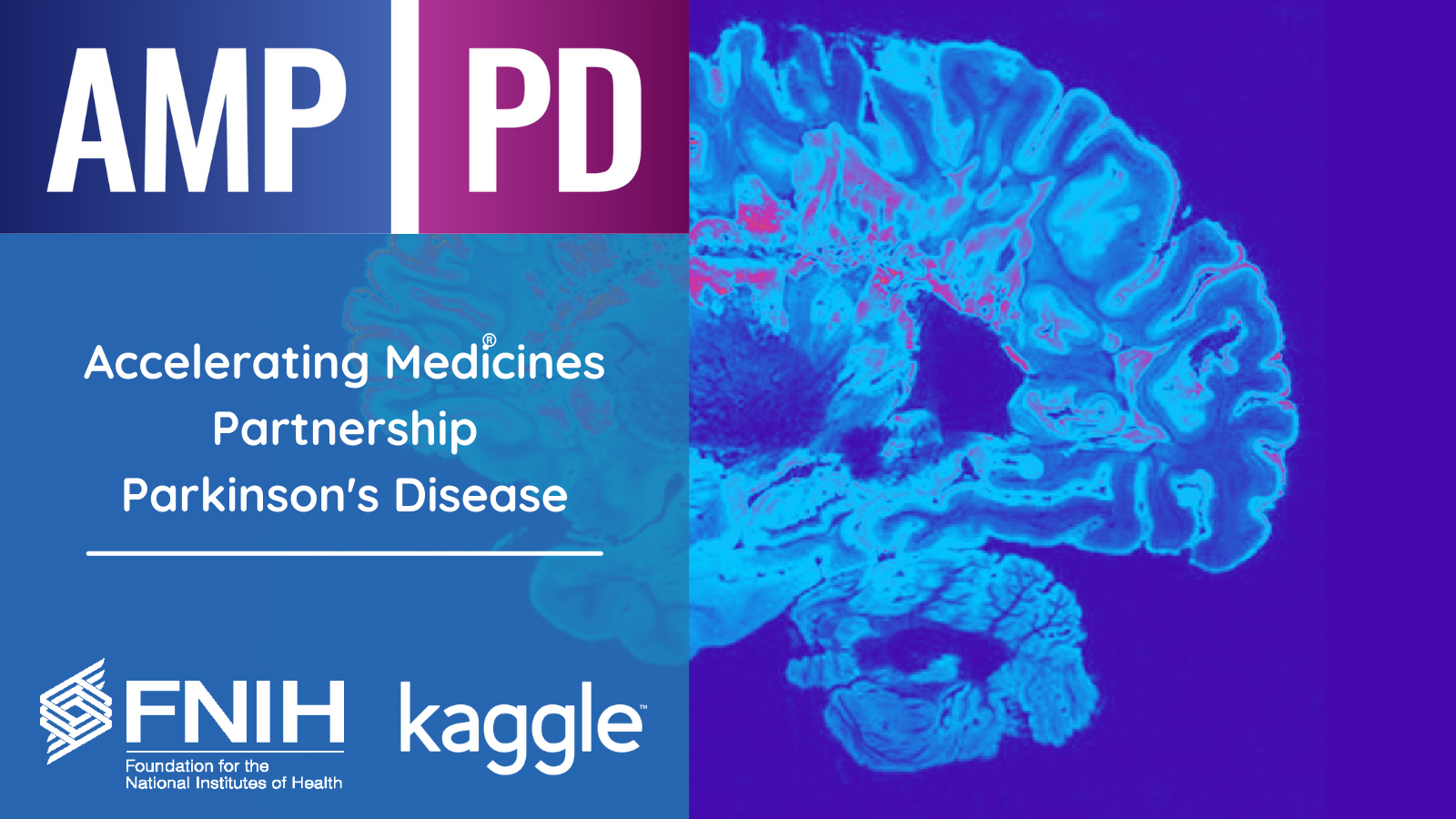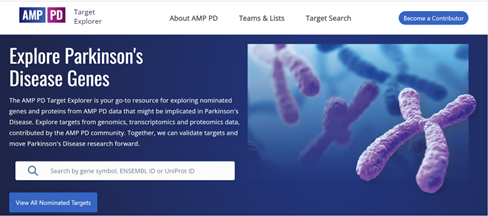September 2023 AMP PD Newsletter

The AMP PD Target Explorer is a public resource with open access for exploring nominated genes and proteins from AMP PD data that might be implicated in Parkinson's Disease. The Target Explorer integrates many AMP PD work streams focused on identifying new biomarkers and novel drug targets, with the goal of accelerating treatment discovery for patients with Parkinson's Disease.
How can I contribute my PD targets and biomarkers?
Nominating targets benefits your study and the AMP PD program. When you contribute your target nominations, it will be added to the AMP PD Target and Biomarker list with existing nominations to facilitate search and discovery This also provides your research greater exposure with links back to your data and your publications as the definitive source for Target Explorer users to read, reuse, and reference in their work.
To discuss the contribution of your Target and Biomarker list, please use this form or send an email to us at
admin@amp-pd.org.
AMP PD has released a number of Community Workspaces this quarter. Please see the links below to find the data and notebooks that produced it, which are available to all registered users of AMP PD with Tier-2 access.
AMP PD Tandem Repeat Expansion Pipeline Workflows: This workspace, developed by Bharati Jadhav at the Icahn School of Medicine at Mount Sinai, describes the pipeline to identify short tandem repeat expansions using the STRetch and GangSTR workflows on the Terra platform. These workflows are designed for Whole Genome Sequencing data starting from mapped cram files.
Accelerating Parkinson’s Diagnosis using Multi-omics and Artificial Intelligence: This workspace was created by Dr. Ruifeng Hu. Within the workspace, there are scripts for data pre-processing, differentially expressed genes analysis and Parkinson's Disease diagnosis classifier models will be introduced. This workspace contains 6 main workspace notebooks, a start here notebook and a final move data for download notebook.
AMP PD Simulated Proteomics Data Set: No AMP PD access required! This publicly available workspace utilizes a publicly available simulated proteomics data set, created by AMP PD. This lets you see what AMP PD workspaces and data look like before applying for access. Note that a billing project in your account is needed to run this workspace.
Target Explorer Transcriptomics Differential Expression: This workspace was created by AMP PD and used in generating the transcriptomics target list for the Target Explorer. This workspace uses transcriptomics data from Release 3 and uses Limma to create a differential gene list.
Target Explorer Differential Protein Expression: This workspace was created by AMP PD and used to generate the proteomics target lists for the Target Explorer. This workspace utilizes the targeted proteomics data from Release 3 and uses Olink R tools to generate a differential protein list using a t-test.

The AMP PD program partnered with the data science company Kaggle to sponsor a competition aimed at predicting Parkinson's disease progression using protein and peptide data from cerebrospinal fluid. Between February 16 and May 18, 2023, an impressive 1805 teams from all over the world focused their data analytic talents on this question. We are pleased to announce that the prize-winning entries were submitted by:
1st Prize ($25,000): “Team Connecting Dotts”
2nd Prize ($20,000): "No Luck All Skill"
3rd Prize ($15,000): "Hajime Tamura"
We want to congratulate the winners and thank all the participants for their efforts and clever solutions! In addition to showcasing the synergy between data science and clinical research, this competition demonstrated the potential for making significant strides in understanding Parkinson's disease using team science and nontraditional approaches.

AMP-PD’s next webinar is scheduled for October 4th, 4pm ET to discuss the newly released Target Explorer Tool. Attendees can learn how to use the tool, data availability and its application in identifying therapeutic targets. Sign up here!

M.Sc. Data Scientist
Center for Alzheimer's and Related Dementias, National Institutes of Health; Laboratory of Neurogenetics, National Institute on Aging, National Institutes of Health; Data Tecnica International LLC
Hampton Leonard is a data science consultant with NIA's Laboratory of Neurogenetics and with Data Tecnica International. Hampton has a special interest in the genomics of neurodegenerative disease and a bold approach to wrangling this complex data with statistical and machine learning methods. The AMP PD team was fortunate to enlist Hampton's aid at the start of the program's sequencing efforts because she played a major role in designing and conducting the extensive quality control analyses that were necessary to produce the whole genome sequencing data that we are so proud of. Hampton also helped to highlight the AMP PD platform's capabilities through a datathon she led and hosted. We are grateful for her expert and careful work and are proud to feature her here as an AMP PD team member.
What is your contribution to AMP PD?
I helped as part of a team with the quality control and preparation of the whole genome sequencing data, as well as helped curate resources and training opportunities for researchers new to AMP PD.
How did you become interested in research relating to Parkinson's Disease?
I have always been fascinated with the brain, especially developmental and neurodegenerative disease. When I got the opportunity to join Mike Nalls and Andrew Singleton at the Laboratory of Neurogenetics at NIH, I jumped at the chance. I hadn't worked specifically in PD research before, but quickly became passionate about it as I was surrounded by high quality work and had the opportunity to meet people with PD through advocacy group collaborations. I hope to make even a small contribution to the progress of PD research and therapeutics.
What is your advice for scientists getting started with PD research?
Collaborate! My experience with the PD research community has been incredible in terms of the willingness to share data and expertise. Try to join a PD consortium or trainee community, not only will it increase the quality of your work, but working together can make research easier and faster.